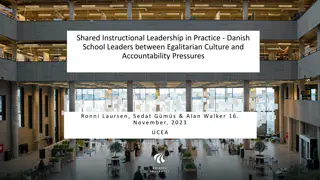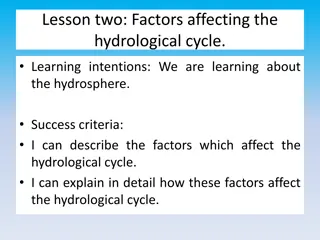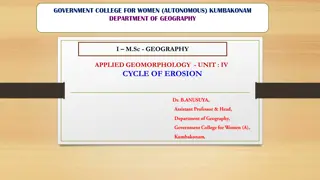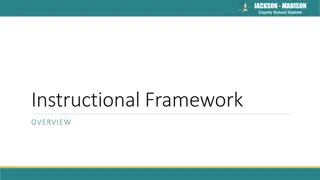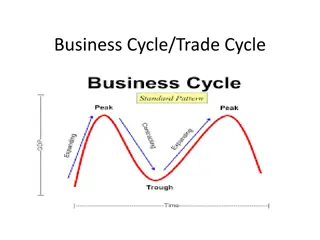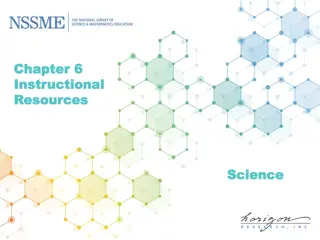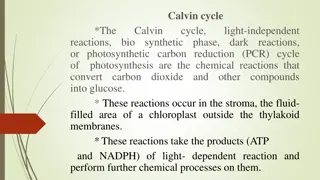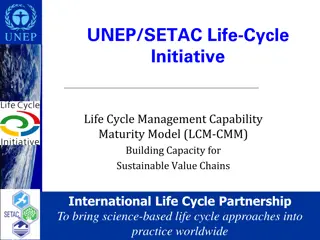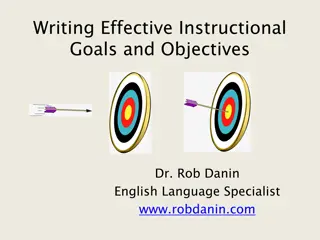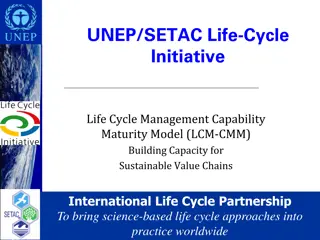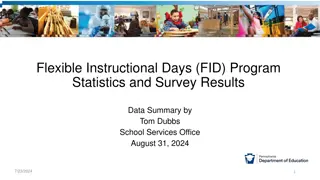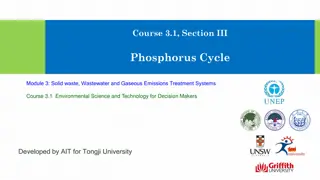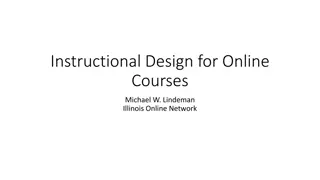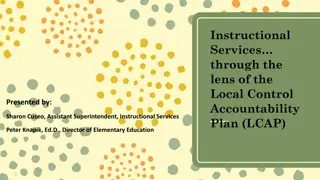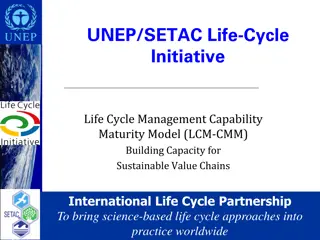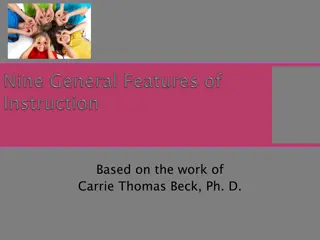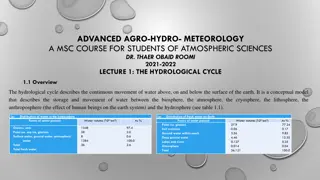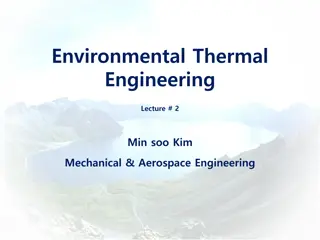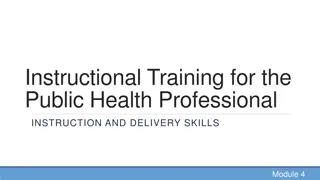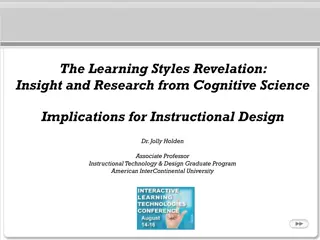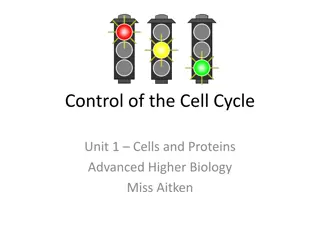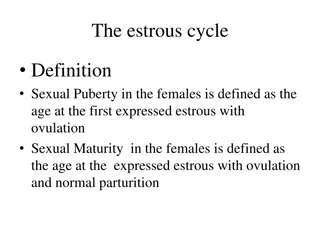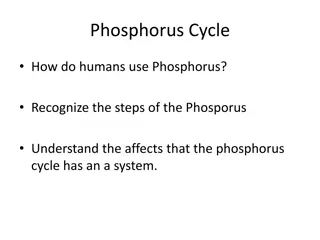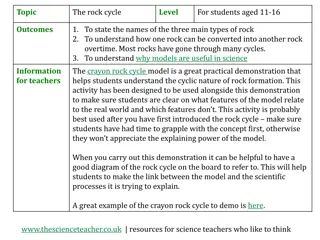Exploring Shared Instructional Leadership in Danish Schools
This study delves into how principals implement shared instructional leadership in Danish primary and lower secondary public schools, aiming to enhance dialogue on its potential in diverse cultural contexts. The Danish educational landscape, emphasizing autonomy and democratic participation, poses c
1 views • 14 slides
Academic Progress Monitoring for Effective Instructional Planning
Academic progress monitoring involves measuring student performance to evaluate responsiveness to interventions, guide instructional decisions, and determine when adjustments are necessary. It helps identify students needing additional support, compare instructional effectiveness, decide on changes,
2 views • 44 slides
Behavior Progress Monitoring for Individualized Instructional Planning
Utilizing behavior progress monitoring allows educators to track student performance over time, make data-informed decisions to improve responsiveness to interventions, and tailor instructional plans for individual students. This comprehensive approach involves steps such as setting the stage, analy
6 views • 52 slides
Factors Affecting the Hydrological Cycle: Understanding Physical and Human Influences
The hydrological cycle is influenced by both physical and human factors. Physical factors such as relief, vegetation, basin size, rock type, soil type, and climate all play a role in shaping the movement of water through the cycle. Human activities like forestry, urbanization, deforestation, mining,
2 views • 20 slides
Understanding the Accounting Cycle Process
The accounting cycle is a comprehensive process that involves recording and processing all financial transactions of a company, from their occurrence to their representation in financial statements and closing of accounts. It is crucial for bookkeepers to manage the entire cycle, which includes step
0 views • 11 slides
Urea Biosynthesis and the Krebs-Henseleit Cycle in the Liver
Urea is synthesized in the liver through a series of enzymatic steps known as the urea cycle or Krebs-Henseleit cycle. This process involves converting toxic ammonia into urea, a less toxic and water-soluble compound that can be easily excreted in urine. The liver plays a crucial role in urea biosyn
1 views • 20 slides
Understanding the Cycle of Erosion: Applied Geomorphology Perspective
The Cycle of Erosion model, developed by Davis in the 1880s, explores the process of landmass upliftment, river erosion, and landscape transformation. The Normal Cycle of Erosion focuses on fluvial processes as the primary geomorphic agent, leading to the formation of peneplains. This cycle progress
0 views • 23 slides
Jackson-Madison County School System Instructional Framework Overview
In the Jackson-Madison County School System, the focus is on a research-based instructional framework consisting of curriculum, lesson structures, and authentic literacy. Emphasizing the importance of a content-rich curriculum, effective teaching practices, and purposeful literacy, the district aims
0 views • 37 slides
Understanding the Accounting Cycle
The accounting cycle is a comprehensive process that involves recording and processing all financial transactions of a company, from their occurrence to their representation on financial statements and closing the accounts. This cycle, essential for bookkeepers, includes steps like transactions, jou
0 views • 11 slides
Understanding the Business Cycle and Its Phases
The business cycle, also known as the trade cycle, depicts the cyclical nature of economic activity with alternating periods of prosperity, recession, depression, and recovery. It involves fluctuations in production, prices, income, employment, exports, and imports. The cycle affects all industries
0 views • 15 slides
Science Instructional Resources Usage in Elementary and Middle School Classes
Explore the utilization of instructional resources in science classes across elementary and middle schools. The data showcases the distribution of various types of resources such as textbooks, kits/modules, online units, and more designated for educational purposes. Discover the percentage breakdown
0 views • 52 slides
Understanding the Calvin Cycle in Photosynthesis
The Calvin cycle, also known as the light-independent reactions, is a crucial part of photosynthesis where carbon dioxide is converted into glucose. This cycle occurs in the stroma of chloroplasts and utilizes ATP and NADPH from the light-dependent reactions to produce sugars for plants. It consists
5 views • 15 slides
Ideal Reheat Rankine Cycle Analysis for Steam Power Plant
Analyzing the thermal efficiency and mass flow rate of an ideal Rankine cycle with superheat and reheat using steam as the working fluid. The cycle involves stages of expansion, reheating, and condensing to generate a net power output of 100 MW. Detailed calculations for states of the cycle are prov
1 views • 5 slides
Adapting Contest Strategies for Declining Solar Cycle 24 and Solar Cycle 25 Precursors
As Solar Cycle 24 rapidly declines, preparations for the subsequent Solar Cycle 25 are crucial. Insights on weak solar activity, potentially weak Cycle 25, and the impact on contest strategies are discussed. Improved DX propagation, reliable openings, and signal strengths to Europe and Japan, amidst
0 views • 12 slides
Recognizing Patterns of Dating Violence and the Cycle of Abuse
Understanding the phases of dating violence is crucial in recognizing and addressing abusive behavior. The cycle typically begins with tension building, leading to an explosion of abuse in various forms. This is followed by a honeymoon phase where the abuser apologizes and makes promises. However, t
0 views • 6 slides
Sustainable Value Chains and Life Cycle Management Capability
The UNEP/SETAC Life-Cycle Initiative focuses on building capacity for sustainable value chains through the Life Cycle Management Capability Maturity Model (LCM-CMM). It emphasizes implementing science-based life cycle approaches globally by transitioning from events to management systems, conducting
1 views • 12 slides
Legislative Changes in School Calendar Policies
Significant legislative revisions were made to school calendar statutes in West Virginia during the 2013 legislative session, allowing more flexibility for county boards to develop calendars while ensuring a minimum of 180 instructional days. The changes mandated public hearings, set guidelines for
1 views • 63 slides
Enhancing Instructional Leadership Through Classroom Walkthroughs
Effective instructional leadership in schools involves principals taking on roles as instructional leaders through classroom walkthroughs. These walkthroughs help assess teaching strategies, student engagement, and classroom practices, leading to improved learning outcomes. By focusing on key compon
0 views • 7 slides
Writing Effective Instructional Goals and Objectives in Education
Determine the importance of setting clear instructional goals and objectives for effective lesson planning in education. Explore the difference between goals and objectives, understand how to write instructional goals, and learn to create specific, measurable instructional objectives for student ach
0 views • 12 slides
Life Cycle Management for Sustainable Value Chains: Building Capacity and Promoting Innovation
This content delves into the Life Cycle Management Capability Maturity Model (LCM-CMM) aimed at enhancing sustainable value chains globally. It emphasizes the importance of bringing science-based life cycle approaches into practical implementation to address global issues, international standards, c
1 views • 11 slides
Flexible Instructional Days (FID) Program Overview
The Flexible Instructional Days (FID) Program allows schools to provide remote instruction on days when traditional delivery is not feasible. Schools must apply to the Pennsylvania Department of Education (PDE) to participate in the program, which requires approval by the entity's governing body. FI
0 views • 25 slides
Enhancing Instructional Delivery Through Student Voices: A Study by Yelonda Harvey
Yelonda Harvey conducted a study at a Title I school in Ward 7 to investigate the impact of different instructional strategies on students' academic progress. The research involved administering questionnaires to fifth-grade science students, focusing on student preferences for various teaching moda
0 views • 16 slides
Fuel Cycle Analysis Toolbox: Enhancing Understanding and Optimization
This presentation focuses on the analyses and evaluations essential for assessing the potential of a fuel cycle, emphasizing different time scales, system sizes, objectives, and audiences. It discusses the need for coupled analyses, various tools required, and opportunities for improvement through i
1 views • 11 slides
Understanding the Phosphorus Cycle in Environmental Science
Exploring the intricate processes of the phosphorus cycle, this module delves into how solid waste, wastewater, and gaseous emissions are treated within environmental science and technology frameworks. The discussion covers the distinctive aspects of the phosphorus cycle, its impact on land and wate
0 views • 13 slides
Effective Strategies for Online Course Development
Instructional Design for Online Courses by Michael W. Lindeman presents valuable insights into the systematic process of translating learning principles into instructional materials. It covers differences between face-to-face and online course planning, considerations for online course development,
0 views • 27 slides
Overview of Instructional Services through LCAP
Explore how Instructional Services, including Elementary Education, Special Education, Child Development, Instructional Technology, Arts & Career Technical Education, and Induction programs, are structured and evaluated within the context of the Local Control Accountability Plan (LCAP). The organiza
0 views • 38 slides
Role of Cell Cycle in Nanoparticle Uptake and Dilution in Cell Population
The cell cycle plays a crucial role in the cellular uptake and dilution of nanoparticles within a cell population. This process involves different phases such as G1, S, G2, and M, each with specific functions related to cell growth, DNA synthesis, protein synthesis, and cell division. Understanding
0 views • 20 slides
Reconsidering the Matching of Texts to Students' Reading Levels
The prevailing belief that instructional materials should be tailored to students' reading levels to enhance learning may not be as effective as commonly thought. Contrary to this idea, evidence suggests that such text placements can hinder rather than facilitate student reading achievement. The his
0 views • 45 slides
Sustainable Value Chains and Business Context in Life Cycle Management
The UNEP/SETAC Life-Cycle Initiative focuses on building capacity for sustainable value chains worldwide through the Life Cycle Management Capability Maturity Model. Understanding the competitive, environmental, and business contexts is crucial for implementing science-based life cycle approaches ef
0 views • 15 slides
Effective Instructional Strategies for Engaging Students
Instructional tasks are modeled appropriately, explicit instruction is provided, and students are engaged in meaningful interactions. Opportunities for practice and corrective feedback are given, while encouraging student effort and success. Demonstrations and step-by-step guidance help students lea
0 views • 58 slides
Understanding the Hydrological Cycle in Advanced Agro-Hydro-Meteorology
The hydrological cycle involves the continuous movement of water on, above, and below the Earth's surface, encompassing various realms such as the biosphere, atmosphere, cryosphere, lithosphere, and hydrosphere. This cycle describes the storage and movement of water within different Earth systems an
0 views • 14 slides
Fundamentals of Environmental Thermal Engineering in Mechanical & Aerospace Engineering
Explore the key concepts of environmental thermal engineering in Mechanical & Aerospace Engineering, covering topics such as the Carnot cycle, actual vapor-compression cycle, principles of the vapor-compression cycle, Carnot heat engine, refrigeration cycle, and coefficient of performance. Understan
0 views • 51 slides
Instructional Training for Public Health Professionals Module 4
This module focuses on enhancing instructional and delivery skills for public health professionals. Participants will learn to identify factors for effective delivery, recognize positive presentation skills, and describe tools used in instructional settings. Topics covered include instructor aptitud
0 views • 23 slides
Learning Styles and Instructional Design: Debunking Misconceptions
The concept of learning styles as predictors of learning outcomes is widely misunderstood. Research shows little impact on learning outcomes. This presentation explores the implications for instructional design and questions the relevance of considering learning styles as a variable in instructional
0 views • 56 slides
Understanding Cell Cycle Control in Biology
Maintaining control of the cell cycle is crucial to producing healthy daughter cells and preventing mutations that can lead to degenerative diseases like Parkinson's or cancer. Cell cycle checkpoints at G1, G2, and Metaphase ensure the cell meets specific requirements before progressing to the next
0 views • 11 slides
Jackson-Madison County School System Instructional Framework Overview
The Jackson-Madison County School System focuses on engagement through a research-based instructional framework centered on curriculum, lesson structures, and authentic literacy. Emphasizing the importance of a content-rich curriculum and effective teaching practices, the district aims to improve in
0 views • 26 slides
Comprehensive Analysis of Instructional Model and Engagement in a Lesson
This analysis examines the instructional models exhibited by a teacher during a lesson, focusing on engagement and strengths. Recommendations for potential improvements are also discussed. The content includes images and discussions on identifying instructional models, strengths of the lesson, and r
0 views • 6 slides
Understanding the Estrous Cycle in Female Animals
The estrous cycle is a reproductive phenomenon in female animals, consisting of different phases like proestrus, estrus, metestrus, and diestrus. This cycle determines the periods of sexual receptivity and fertility in various species such as cows, ewes, sows, and mares. Factors like season, nutriti
0 views • 20 slides
Understanding the Phosphorus Cycle and Its Impact on Ecosystems
Humans use phosphorus in various ways, from being a vital component in DNA, RNA, and cell membranes to its role in energy transfer processes. The phosphorus cycle involves steps such as weathering of rocks, phosphate mining for fertilizers, excretion/decomposition, and geologic forces. However, exce
0 views • 8 slides
Exploring the Rock Cycle Using the Crayon Rock Cycle Model
This educational resource focuses on teaching students aged 11-16 about the rock cycle, including the types of rocks, how rocks transform over time, and the importance of models in science. It introduces the crayon rock cycle model as a hands-on demonstration to help students grasp the cyclic nature
0 views • 4 slides
